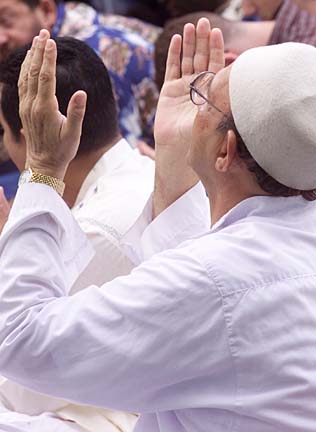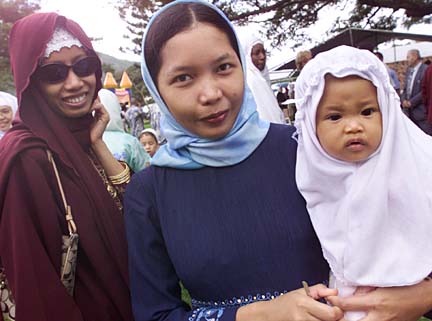



|
Manoa celebrants or weeks after Sept. 11, many Hawaii Muslims said they were afraid to leave their homes for fear of backlash against them for the terrorist attacks.
recall the less fortunate
The religious outing, ending a
month of fasting, shows
solidarity in IslamBy Leila Fujimori
lfujimori@starbulletin.comBut yesterday, hundreds of Muslims of all races, ages and ethnicities gathered at a grassy Manoa park to celebrate the feast of Eid al-Fitr, ending the holy month of Ramadan. Many said the celebration gave occasion to strengthen their faith and unite with fellow believers.
Hakim Ouansafi, president and chairman of the Muslim Association and the Islamic Center of Hawaii, reminded Muslims to stay united and strong, and to remember in their prayers those who are not so privileged.

|
"The fasting is a reminder of the many who are underprivileged. It makes us feel what they feel all year long," Ouansafi said.Dressed in a wide array of traditional and modern attire, the Muslims ended their monthlong sunrise-to-sunset fasting with supplications and prayers at Manoa Valley District Park. The outing included lunch of barbecued chicken, rice and salad, with ice cream and candy for children.
The group also took up a collection to be distributed to suffering people in Afghanistan, Ethiopia and the Palestinian territories.
Meanwhile, much of the discussion focused on Afghanistan, with many opposed to the United States' current bombing campaign not only because it has taken place during Ramadan, but also because innocent lives have been lost.
"It's not justifiable," said Akram Khalil, an Afghan American who has relatives in Afghanistan whom he has not heard from and does not know whether they are alive. "A group of people might be responsible, but not the whole country."

|
Lutfi Sen, a post-doctorate fellow from Turkey at the University of Hawaii, said that as Muslims, "We condemn killing innocent people anywhere. State terrorism, group terrorism or killing innocent people in a war -- it's not acceptable."But Sen said he and his wife enjoy more freedom in the United States than in democratic Turkey, where his wife, wearing a scarf (a display of her religion), cannot go to the university because of government secularism.
Discussion also took place on the treatment that many of those in attendance have been subject to since Sept. 11.
Ahyana Asman, a Caucasian woman who converted to Islam with her husband six years ago, said Muslim women particularly are "on the front lines" because many are immediately recognizable through their dress.
"People know automatically," said Asman, 32, who always is covered from head to toe. "People looked at us differently before, in a quizzical manner. Now it's a dirty look. People are suspicious."
While she has endured some derogatory remarks, she and her husband, Karim, said their three children have largely been unaffected by discrimination.
"There's been more friendly encounters with strangers walking up to us with big smiles," Karim Asman said.

|
Others also said they have received support from the community."In Hawaii they understand, especially because of what happened to the Japanese during World War II," said Silla Siddiqui, who originally is from India and has lived in Hawaii for 30 years.
After Sept. 11, Lena Hasan, 23, a University of Hawaii student born and raised here, said she has received supportive e-mails and calls from fellow students and faculty. Hasan, who lived in the Palestinian territories for four years, has taken wearing the "hijab," or head covering, with responsibility to represent Islam.
She emphasizes to people it is not cultural, but religious.
"Now it has turned into pride in my religion," Hasan said.